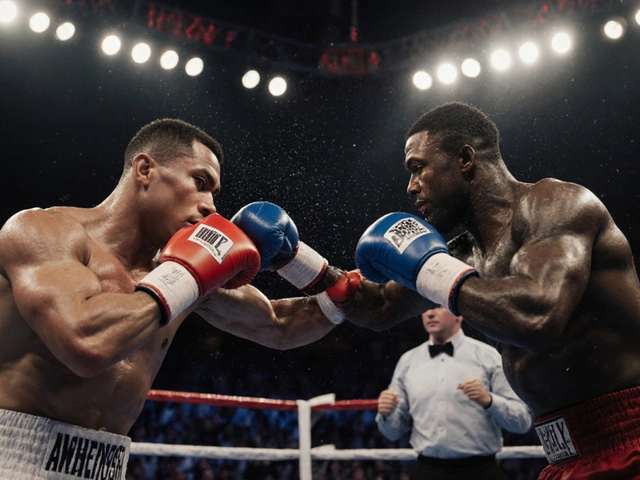Ever stood ringside or tuned into a big fight, wondering if you should call it a match, a bout, or just a fight? Turns out, there's more than one way to talk about a boxing showdown, and you won't look clueless if you get it right.
Here's a little secret: 'boxing match' is the plain and safe choice when you're not sure. But in boxing circles, fans and announcers have a whole toolbox of words, and each one can make you sound more in-the-know. Want to chat like you've been following boxing forever? It's easier than you think.
- What Do You Actually Call a Boxing Match?
- Common Terms Fans and Announcers Use
- Breaking Down the Stages: From Undercard to Main Event
- Pro Tips: Sound Like You Know Boxing
What Do You Actually Call a Boxing Match?
If you asked ten different boxing fans, you’d probably get three or four answers for what to call a boxing match. Most folks just say “fight” without thinking twice, but if you’re aiming for accuracy, there are a few main go-to words: match, bout, contest, and fight. Here’s what they all mean:
- Match: The most general and safe term. Any official pairing between two boxers falls under this. It works for everything from kid’s amateur matches to professional title showdowns.
- Bout: You’ll hear this one almost every time you watch a fight on TV. It's the classic word for a formal, scheduled boxing match.
- Fight: The most casual term. Fans, boxers, and even coaches use “fight” in regular conversation. It usually means an actual contest, not just a sparring session.
- Contest: This one pops up more in rulebooks and official documents. If you’re talking about regulations or the official card, “contest” is a solid choice.
Here’s a quick glance at where each term fits in day-to-day usage:
| Term | Where You're Most Likely to Hear It |
|---|---|
| Match | Everyday speech, general conversation, press releases |
| Bout | TV commentary, fight cards, official ring announcements |
| Fight | Fans talking, social media, interviews |
| Contest | Official documents, rulebooks, formal descriptions |
The real tip? Nobody at an actual boxing match will blink if you call it a match, bout, or fight. Just skip the word “game”—boxing isn’t a game and using that will definitely get you funny looks from die-hard fans!
Common Terms Fans and Announcers Use
Sit ringside or flip on a big fight, and you’ll hear more than just “boxing match.” The vocab around these events is its own thing, and knowing what fans and announcers actually say just makes it easier to follow the action—or keep up in a group chat.
Here are the go-to terms you’ll hear and what they mean:
- Bout: The official word for a contest between boxers. It’s used all the time by the experts. Broadcasters love it for a reason—it’s simple, and it sounds serious enough for a title fight or a quick preliminary.
- Fight: Just as basic as “match,” but way more punchy. Fans use this for nearly any contest—small or huge, pro or amateur. If you say, “Did you watch the fight last night?” everyone knows what you mean.
- Main Event: This is the headline act of the night. When someone says, “The main event is about to start,” they mean the top-of-the-bill showdown, usually with the biggest names and often a title at stake.
- Undercard: These are the earlier boxing matches before the big stars hit the ring. Sometimes the undercard features rising talent or fan favorites. Hardcore fans pay attention because future champs often get their start here.
- Scrap: This is more slang but you’ll hear it from fans and sometimes on broadcast: “That was a good scrap!” It usually means the fight was wild or unexpectedly rough.
Here’s a handy table breaking down some of the popular terms:
| Term | When to Use | Who Uses It Most |
|---|---|---|
| Bout | Official, all levels of boxing matches | Announcers, officials |
| Fight | Any contest, casual convo | Fans, media, everyone |
| Main Event | Biggest match of the night | Promoters, broadcasters |
| Undercard | All bouts before the main event | Fans, commentators |
| Scrap | Slang for any brawl or rough bout | Fans, sometimes media |
Knowing the right word makes you sound like you get the sport—and it’s just more fun than always saying “boxing match.” Next time you hear someone ask about the undercard, you won’t have to Google it mid-fight.

Breaking Down the Stages: From Undercard to Main Event
If you're new to the scene, watching a boxing match means you’ll hear a bunch of names thrown around for different parts of the night. They all lead up to the big showdown, but each stage has its own vibe and reason for being there.
Let’s clear up what each term actually means so you never get lost. Here's how a typical night plays out:
- Undercard fights: These are the earlier boxing matches before the main story. You'll usually see up-and-coming boxers, sometimes local favorites, or fighters looking to gain more experience. Promoters throw these matches in to fill seats and hype up the crowd. Sometimes, an undercard fight even steals the show if it's action-packed.
- Co-main event: This is the second-biggest fight of the night. It’s the last bout before the main event and usually features two well-known contenders. It sets the stage for the main event and can be a major draw on its own.
- Main event: This is what everyone pays for—the big headline boxing match. It usually involves title belts, huge names, or seriously hyped rivalries. When people talk about 'fight night,' this is the one they mean.
Some cards can also have a 'featured bout' in between, but the big three—undercard, co-main event, and main event—are the real anchors of most boxing events.
| Stage | Typical Purpose | Who's Fighting? |
|---|---|---|
| Undercard | Warm up the audience, build emerging talent | New or less-established boxers |
| Co-main event | Boost hype, deliver a solid contest before the finish | Highly ranked but not headline fighters |
| Main event | Headline, draw ticket sales, crown champions | Superstars, world champions, top contenders |
One more tip: What promoters call the lineup can sometimes be part of marketing. You might see 'title eliminator' or 'world championship bout' too, and those just give extra weight to the stakes involved in that match.
Pro Tips: Sound Like You Know Boxing
If you really want to sound like you belong at a boxing match, it's all about picking the right words and knowing when to use them. Nobody wants to be the fan yelling, “Go team!” at the wrong moment, right?
Here’s what seasoned fans and commentators say, and when to drop these terms:
- Bout: This is basically any boxing match. It sounds more official than just saying “fight.” Use this when you’re talking about a single match on a fight card.
- Main event: Always save this for the big headline fight of the night. If you use it for an undercard, you’ll get some weird looks.
- Undercard: The earlier fights before the main event are called the undercard. If you show up early and mention you’re excited for the undercards, you’ll instantly sound like you did your homework.
- Title fight: This one’s pretty self-explanatory—the match where a championship belt is on the line. Don’t call every fight a title fight, though, or die-hard fans will catch on quickly.
- Split decision, unanimous decision, knockout (KO), technical knockout (TKO): These are the different ways a boxing match can end. For example, “That was a split decision—really close call by the judges.” Throw these in when talking about how the night’s battles wrapped up.
If you want to sprinkle in stats, here’s a quick reference of how often fights end certain ways at the world title level:
| Result Type | Percent of Title Fights |
|---|---|
| Unanimous Decision | 45% |
| Split/Other Decisions | 15% |
| Knockout (KO) | 30% |
| Technical Knockout (TKO) | 10% |
One last tip: everybody loves a confident prediction. When talking about an upcoming fight night, don’t be shy. Just say, “I think this one ends in a KO by round 6.” You might be wrong, but you’ll sound like you’ve been watching boxing events for years.





